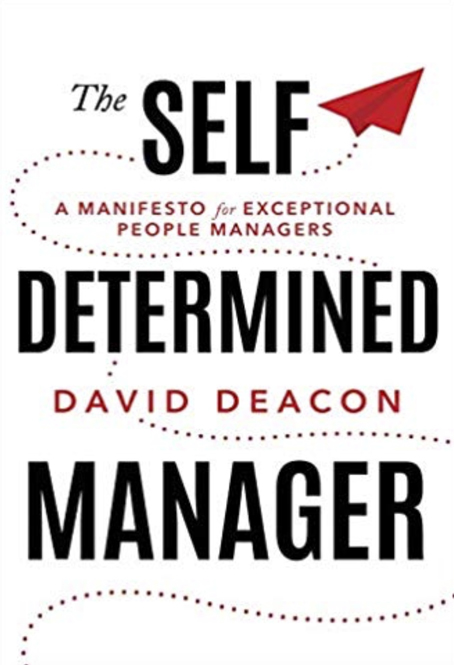Author of The Self Determined Manager and seasoned HR professional, David Deacon, explores how great managers create belonging and inclusion. In the first of three columns, exclusively for Fair Play Talks, he discusses the importance of ‘getting every voice heard’.
PART 1: GET EVERY VOICE HEARD
I’m on a bit of a self-appointed mission to have every manager think differently about what their role is really all about. We have misled managers for decades, telling them that their jobs are transactional, procedural and directive. We’ve been wrong; transformational, enabling and supportive are becoming the new normal for managers who want to be successful now and in the future.
In my book, The Self Determined Manager, I argue that great managers consciously and deliberately set out to create an environment for the team that they lead, and that the very best create environments of success and growth. As a result, the people who work for them do great work – probably better than they realised they were capable of – and grow professionally and (usually) personally.

Consider this: managers can create great environments for their teams even within a broader culture that is toxic in some way, just as you can find poorly managed and unhappy teams within generally fantastic companies. Most of us experience the company that we work for mainly through the manager we report to. Even though many companies are working hard to reach employees directly through communication and engagement initiatives, these (often virtual) interactions are dwarfed by the amount of time and interaction (good or bad) we have with the person one step above us in the organisational hierarchy. Our manager has a significant, maybe disproportionate, impact on how we feel about our work, our performance, our future – and how we feel about the company that we work for and the outcomes we produce.
INCLUSION & FAIRNESS
It follows that a good manager can create a team environment of inclusion, fairness and belonging even in an organisation where the broad diversity agenda needs work (I have seen this in practice, just recently); conversely, a progressive and inclusive organisation can be undermined by a manager who uses bias, favouritism and coercion as tools for managing others.
Self determined managers naturally create diverse and inclusive teams. It’s the outcome of how they choose to lead. They make up their own minds about people, based on merit and nothing else. They expect and encourage great things from every team member in accordance with their capabilities and aspirations, and they encourage professional growth and true engagement from everyone on the team. They make everyone better as a result of working for them.
They also make the team hum. Bias against individuals, discrimination, playing favourites and prejudice have no place in their actions and are not tolerated by them in the team. But sometimes it’s not quite enough to say that great managers do the right thing and model the right behaviour, and therefore good outcomes are the result.
ENABLING SUCCESS
Sometimes, to enable others to also succeed, it pays to be more specific. So with that in mind, here are some thoughts on things that I see great self determined managers do, which every manager should copy to create an environment of inclusion and belonging. They create an environment where every voice can be heard consistently and naturally.
Remember, a self-determined manager makes up their own mind, and acts consciously and deliberately. To create an environment where everyone’s voice can be heard is a choice, a decision that the manager makes, and they set expectations and model the way with deliberate intent. The environment a great manager creates is not accidental; it’s the result of a conscious decision.

GREAT MANAGERS IN ACTION
If you watch these managers carefully, you will see three things that they do deliberately and consistently:
- They go out of their way to encourage people to contribute to the discussions, decisions and workings of the team. Whether making sure everyone’s point of view is sought, or ensuring that all perspectives are considered in decision making, they are active seekers of getting everyone to have a say. You will see them ask people specifically for their thoughts; you’ll hear them use encouraging language like “I love you said that”, or “thanks for raising that”. They do this whether they agree or not with the comment, whether it’s popular or controversial; whether it’s a new thought or a build. They actively, overtly and deliberately include everyone.
- They watch carefully the way the team works together and they intervene to stamp out the kinds of behaviours that mute people; the put-downs, the bullying, the stealing of ideas, the ignoring, the sarcasm, the non-verbal stuff. In other words, they stamp out anything that gets in the way of people feeling they can and should contribute, and usually in a clear and direct way. This way everyone on the team knows that respectful behaviour towards each other isn’t optional; it’s the way the team works.
- They actively acknowledge and celebrate contributions made. Transparently and consistently, they thank, appreciate and acknowledge ideas brought and points raised. Again, they might not agree – indeed often they do not – and the comment made might not be the one that wins the argument; but voices being heard is a cause for celebration, and the best managers therefore overtly applaud that everyone is making a contribution. They do this even-handedly and consistently, with emotion but without drama. You will hear a lot of positive endorsement without critique and caveats because they know that the value is in the voices.
SUPPORTING SUCCESS
Sometimes, however, when they see the need, they will tilt the scales in favour of the people who find it hardest to get heard. Not all the time, but enough times to give them some confidence that they can have a platform, and enough times to remind the team that everyone’s point of view matters. After a while, magic happens and the team starts to do that for themselves; helping to pick up those who are dropping behind. A supportive manager creates a supportive team.
However, I’d like to make a clear point about great managers. They are supportive and encouraging, and they create a positive environment for their team. But they also set high standards, they push people to do better and be better. They are ambitious and impatient for important outcomes. They obsess about impact and making a difference. Great managers are not soft or undemanding; indeed they are pretty tough to work for. But if you are working for a manager like this, in return for your great attitude and effort, they will give you confidence, energy, momentum and purpose, within an amazing team culture, which will help everyone to participate and succeed on their own terms.
Great managers make great things happen. Part of how they do it is by making sure that everyone knows they can contribute, knows they should contribute, and gets the chance to contribute. That’s inclusion in action.
In Part 2 of How great managers create belonging & inclusion (to be published next week), David Deacon will explore the importance of ‘finding greatness in each employee’.
AUTHOR BIOGRAPHY
David Deacon’s HR expertise spans more than 30 years. He has worked for a variety of the world’s leading companies, including MasterCard and Credit Suisse, and has lived and worked in the US, UK and Asia. A thought-leader in the fields of learning and development, talent management and leadership development, he has influenced leaders and teams around the world, and created better-managed companies as a result. He continues to drive impact through leading world-class talent management approaches in the companies where he works. In 2014, Deacon was recognised by the Best Practice Institute as a Best Organisational Practitioner. His first book, The Self Determined Manager, was published in 2019; the Self Determined Training Company, helping to create better managers, was established during the same year. Click here for more information.






































